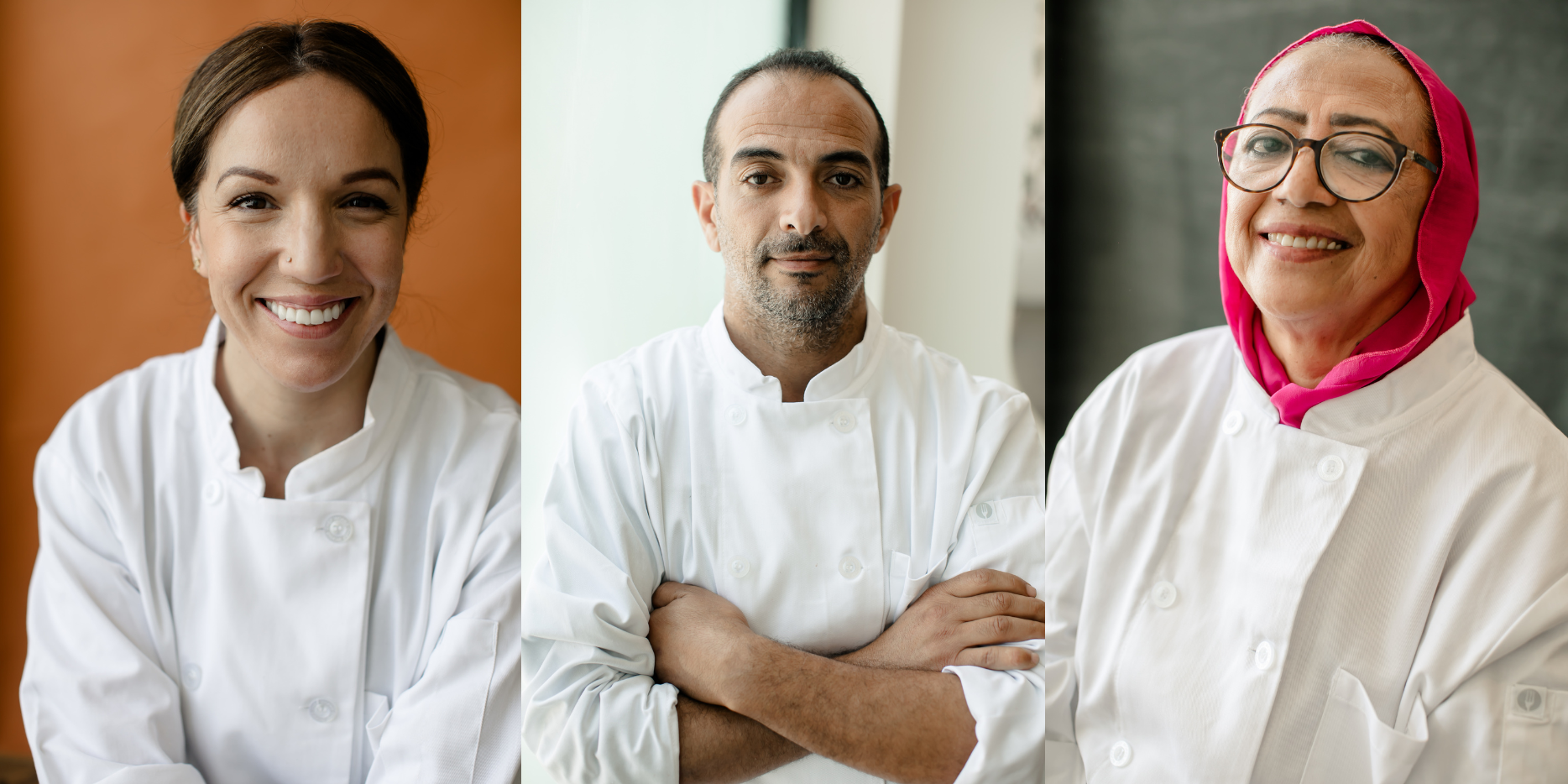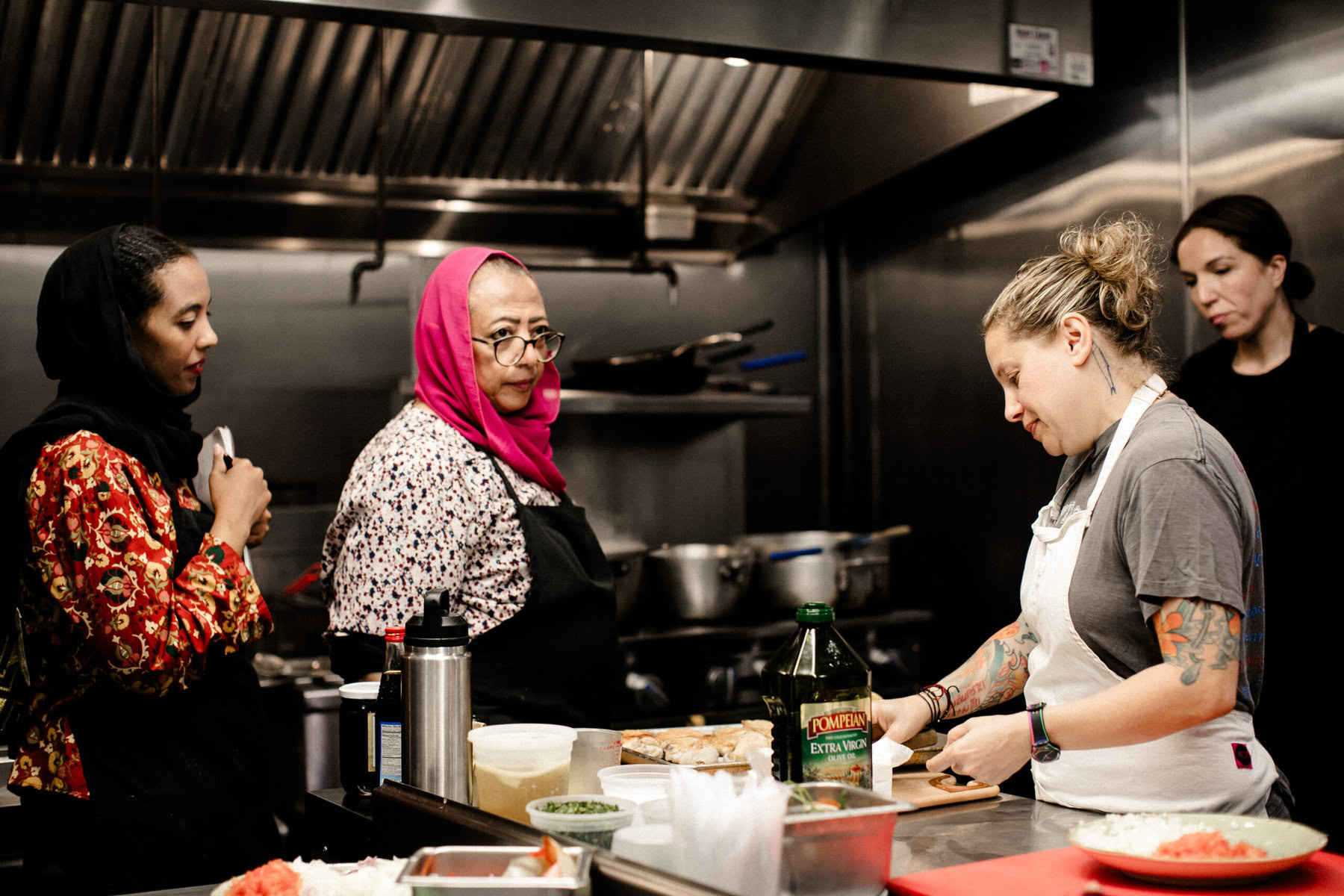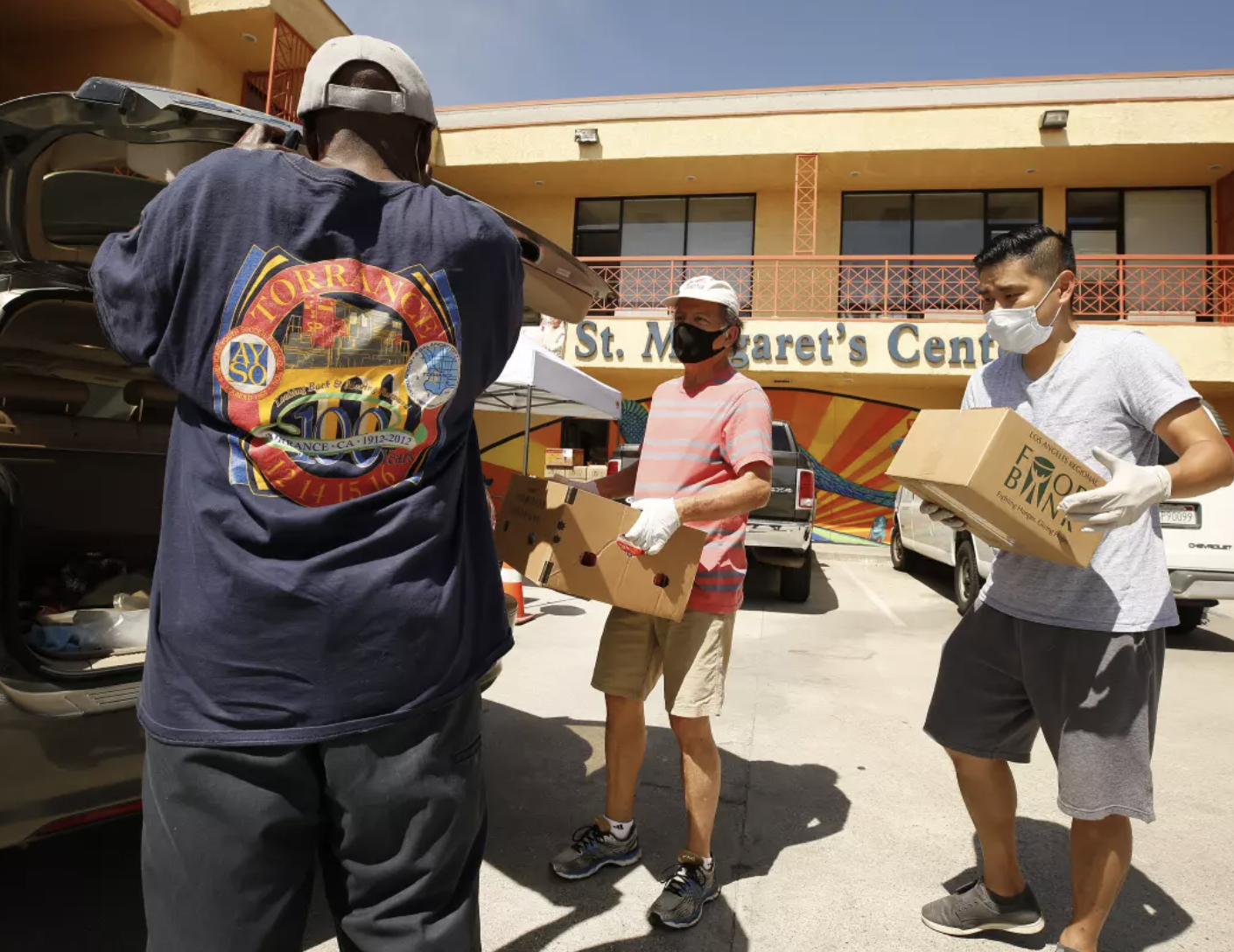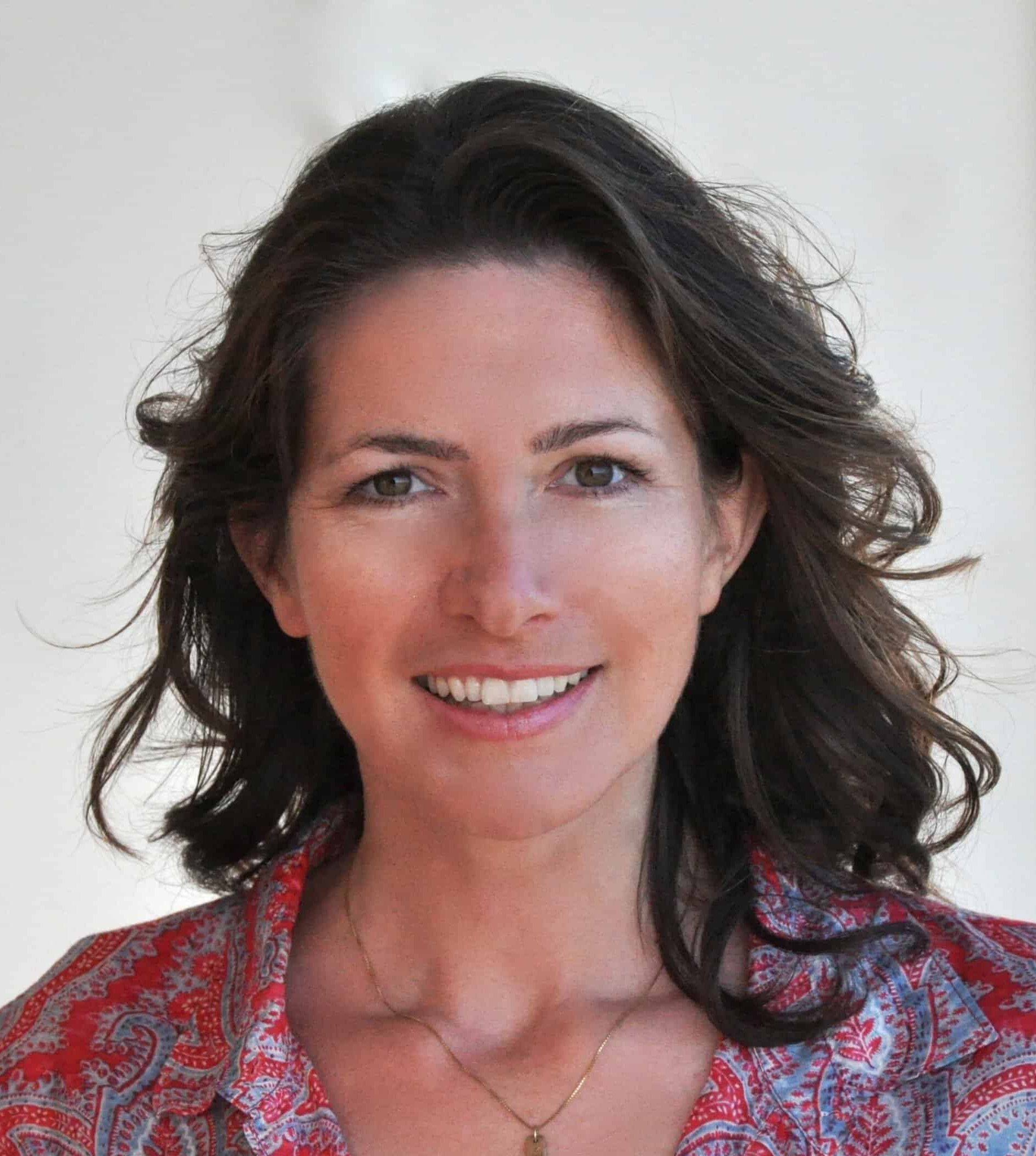Jamie Lauren makes five-star cooking look easy. With a trained hand, the chef adds two eggs and olive oil to the flour, kneads the pasta dough into a pliable ball and shows it to her eager trainees: “Touch it! You must feel it!”
Lauren is the culinary producer for the popular cooking show Top Chef, but today in the shining stainless steel kitchen on Hollywood Boulevard, she is training an unusual group of aspiring chefs: Montassar Dhaouadi, a passionate amateur cook from Tunisia; Eglal Abdelhalim, a retired diplomat for the African Union from Sudan who holds a doctorate in political science and dreams of opening her own restaurant; and Nouel HadjArab, who owned a bakery in Algeria and is a trained pâtissier.
The three trainees have come to the kitchen of the Hollywood restaurant Flavors From Afar not only to learn knife skills and make a tasty rosemary-ricotta filling for handmade ravioli, but so much more: At the end of the eight-week course, they will leave with a culinary training certificate, professional headshots, a presentable résumé, ideas for a complete menu and invaluable connections to the restaurant industry. This restaurant serves empowerment for refugees as the main dish.

“Everybody needs to eat,” says Maymuna Hussein-Cattan, the founder of Flavors From Afar. “I want to help refugees find jobs but at the same time highlight their strengths and culture, celebrate their experiences and demystify stigma. You always hear about a refugee crisis, but most people never learn the real story of the people behind the news.”
By working with rotating chefs from more than a dozen countries, Flavors From Afar offers more than authentic Somali sambusas, Lebanese ouze or Eritrean makleel (donuts). It provides a unique way to foster community while showcasing the skills and complex life stories of the people in the kitchen. One chef, for instance, highlights dishes from all eight countries she was forced to flee to on her escape from Congo. “We believe that those who survived displacement are the true alchemists who can create life after loss,” Hussein-Cattan says. “Surviving tragedies should be celebrated, and we are changing the narrative.”
Hussein-Cattan knows these complexities only too well because she was born in a Somali refugee camp. Her mother, Owliya Dima, had fled Ethiopia and spent 12 years in the refugee camp, where she gave birth to Hussein-Cattan. After they emigrated to California in 1984, Hussein-Cattan completed a master’s degree in developmental organization and wanted to give back to fellow refugees. Her family home was always full of new immigrants whom they were trying to help integrate into American society, and one of the most difficult challenges was finding jobs. Together, Dima and Hussein-Cattan started Tiyya Foundation in 2010, a grassroots effort to help refugees with anything from food to job search. Tiyya means “my love” in her native Oromo, and Hussein-Cattan now runs it with her husband, Shukry Cattan.
“Many of our clients had successful businesses in their homelands; they are doctors, lawyers and engineers or really popular stay-at-home moms that managed the social calendar for the family, and then they come here and are almost treated like children,” Hussein-Cattan says. “The only jobs available to them are usually low paid, like cleaning the house or babysitting or working construction.”
Case in point: Her father trained as a veterinarian in Somalia, but after resettling in San Diego, he got a job as a kennel attendant with the county that he held from 1985 to 2018. “Practically an entry-level job,” Hussein-Cattan comments, “because his veterinarian training was not recognized in the US.” By contrast, Tiyya Foundation’s economic advancement program placed 41 employees in 15 industries and secured close to $3 million in wages for its program participants in 2022 and 2023.
Weighed down by negative news?
Our smart, bright, weekly newsletter is the uplift you’ve been looking for.The culinary program is at the heart of the mission: Flavors From Afar chefs include women like Farah Talaei, originally from Iran, who developed her love for cooking by observing her mother and aunties in the kitchen. She now runs a flourishing catering service in Orange County, serving unique dishes that highlight Persian and Mediterranean cuisines. Or Louie Chavez, an Indigenous chef who is deeply rooted in his Navajo and Apache heritage and strives to preserve the cuisine he learned from his 103-year-old grandmother. “With food, this is the first time they get to be the experts, and they are celebrated on a public platform,” Hussein-Cattan says. “Our chefs are being interviewed by the news media, and there is a pride, which is beautiful to witness.”

She originally started Flavors From Afar as a social enterprise in the Los Angeles neighborhood Little Ethiopia in 2020, but her timing for the restaurant opening could hardly have been worse: right at the beginning of the pandemic amidst stay-at-home orders. She nevertheless managed to highlight rotating chefs once a month and establish a catering service. “Adaptability and creativity are part of a refugee’s life,” she says. Despite its initial difficulties, Flavors From Afar was awarded the Michelin Bib Gourmand in 2022 and 2023, and Los Angeles magazine voted it among LA’s top 100 restaurants.
“A guest who had grown up in Guatemala broke down crying because the Guatemalan chow mein dish took him straight back to his childhood,” she says. “That actually happens quite frequently. Our food is the food the moms cooked at home; you don’t find that anywhere else.” Guatemalan chow mein? “You might think of chow mein as typical Chinese food, but in fact, there was a large Chinese migration to Guatemala,” Hussein-Cattan explains. “Or Somalians also cook a lot of Mediterranean food because of the country’s history with Italian colonists.” Clients might initially think of such dishes as fusion, but to Hussein-Cattan, they are simply authentic dishes immigrants made at home.
While she and her mom originally started helping families from East Africa, over the years the foundation has supported refugees and asylum seekers from 23 countries, for instance, from Syria, Iraq, Palestine and most recently from Ukraine. Each chef brings their own unique history to the table. “In East Africa, almost every family makes their samosas a little different, and my own mother only trusted me enough to share the most secret ingredient for her famous sauce with me recently, once I graduated from the Institute of Culinary Education in Pasadena to learn the restaurant trade,” Hussein-Cattan says with a laugh.
Flavors From Afar just moved into a new, light-filled 3,000-square-foot space on Hollywood Boulevard that will also house the Tiyya Foundation. A percentage of the restaurant proceeds will go directly to the chefs. Another percentage will go to the foundation, which offers family services, English classes, community engagement and career development. Activities include events that make a difference, for instance, a monthly meeting in a park with a playground for the kids, where the foundation offers food and diapers to families in need.
Also, as a mother of a six-year-old daughter and a one-year-old son, Hussein-Cattan envisions a children’s arts and craft area in the restaurant corner that was previously a gallery: “Because where in LA can you have really good food and bring your child at the same time?”
She sits down with Eglal Abdelhalim, the former diplomat from Sudan, to finalize her menu offerings with highlights from her travels all over East Africa, while Jamie Lauren and the other students professionally plate the ravioli, tortellini and Caesar salad they prepared in class today. The dishes are a success. “You have to make the pasta from scratch!” Abdelhalim says with a satisfied sigh. “Mmmmm, that goes straight to the soul!”






